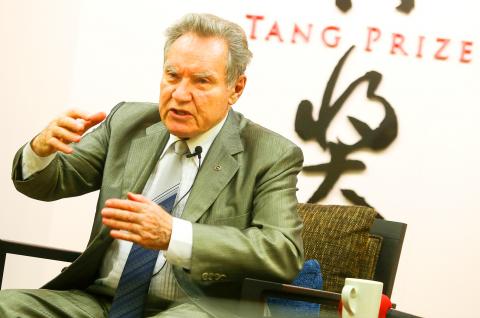The first ever Taiwanese-Russian joint technology transfer workshop was held on Wednesday in Taipei to introduce advanced Russian technology to Taiwanese academics and businesses searching for cooperative opportunities.
Speaking at the opening ceremony, Chern Jenn-chuan (陳振川), head of the Taiwan Chapter of the Russian International Academy of Engineering (IAE) and lead organizer of the event, said the half-day workshop was aimed at facilitating Taiwanese-Russian cooperation in science.
A Russian scientific delegation led by IAE president Boris Vladimirovich Gusev, who helped to found the group’s Taiwanese chapter in 2009, took part in the workshop.

Photo: CNA
A renowned scientist, Gusev is also president of the Russian Academy of Engineering.
“It was 10 years ago when president Gusev first brought two of his deputies to Taiwan and first initiated a decade of exchanges,” Chern said.
Through those exchanges, Taiwan has been better able to learn about Russian expertise in technology and other scientific fields, while the Russian side has gained a first hand understanding of Taiwan’s strength in systems integration and production, Chern said.
The Taiwanese chapter previously sent a delegation on a four-day visit to an IAE forum in Russia, Chern said.
The workshop was to share information on potential business opportunities for Taiwanese academics and companies following the forum in Russia, he said.
“A number of Taiwanese professors and business leaders were invited to the workshop so that they would establish contacts with the IAE,” he said. “This rare opportunity is to inform the Taiwanese side that they can contact our chapter if they are interested in Russian technology and potential business opportunities.”
In his address, Gusev said he first visited Taiwan in 2007.
“The chapter had a somewhat slow start, but caught up quickly,” Gusev said.
Now the chapter is helping Russia conduct comprehensive exchanges with Taiwan, with a focus on renewable energy, sustainable development, engineering materials and environmental protection, among other sectors, he said.
Currently there are 10 major cooperative projects, Gusev added.
The workshop would continue the work started at the forum in Russia and lay a foundation for future cooperation, he said.
Chern is also chief executive of the Tang Prize Foundation, which is responsible for the planning of events associated with the Tang Prize, a set of biennial international awards in four fields — sustainable development, biopharmaceutical science, Sinology and the rule of law.
The nomination and selections are conducted by an independent selection committee, which is formed in cooperation with Academia Sinica.
Gusev is also a member of the Tang Prize international advisory board.

Taiwanese were praised for their composure after a video filmed by Taiwanese tourists capturing the moment a magnitude 7.5 earthquake struck Japan’s Aomori Prefecture went viral on social media. The video shows a hotel room shaking violently amid Monday’s quake, with objects falling to the ground. Two Taiwanese began filming with their mobile phones, while two others held the sides of a TV to prevent it from falling. When the shaking stopped, the pair calmly took down the TV and laid it flat on a tatami mat, the video shows. The video also captured the group talking about the safety of their companions bathing

US climber Alex Honnold is to attempt to scale Taipei 101 without a rope and harness in a live Netflix special on Jan. 24, the streaming platform announced on Wednesday. Accounting for the time difference, the two-hour broadcast of Honnold’s climb, called Skyscraper Live, is to air on Jan. 23 in the US, Netflix said in a statement. Honnold, 40, was the first person ever to free solo climb the 900m El Capitan rock formation in Yosemite National Park — a feat that was recorded and later made into the 2018 documentary film Free Solo. Netflix previewed Skyscraper Live in October, after videos

Starting on Jan. 1, YouBike riders must have insurance to use the service, and a six-month trial of NT$5 coupons under certain conditions would be implemented to balance bike shortages, a joint statement from transportation departments across Taipei, New Taipei City and Taoyuan announced yesterday. The rental bike system operator said that coupons would be offered to riders to rent bikes from full stations, for riders who take out an electric-assisted bike from a full station, and for riders who return a bike to an empty station. All riders with YouBike accounts are automatically eligible for the program, and each membership account

A classified Pentagon-produced, multiyear assessment — the Overmatch brief — highlighted unreported Chinese capabilities to destroy US military assets and identified US supply chain choke points, painting a disturbing picture of waning US military might, a New York Times editorial published on Monday said. US Secretary of Defense Pete Hegseth’s comments in November last year that “we lose every time” in Pentagon-conducted war games pitting the US against China further highlighted the uncertainty about the US’ capability to intervene in the event of a Chinese invasion of Taiwan. “It shows the Pentagon’s overreliance on expensive, vulnerable weapons as adversaries field cheap, technologically